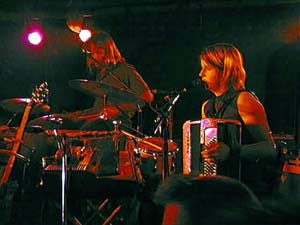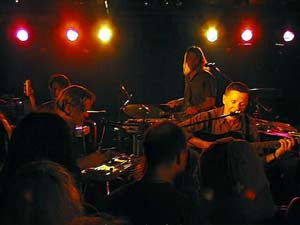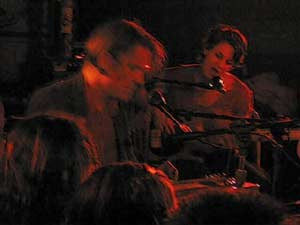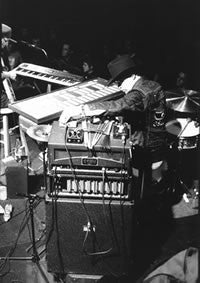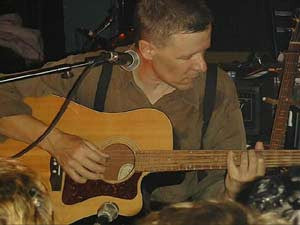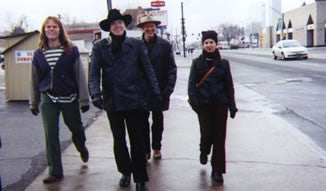How I Loved You
Angels Of Light
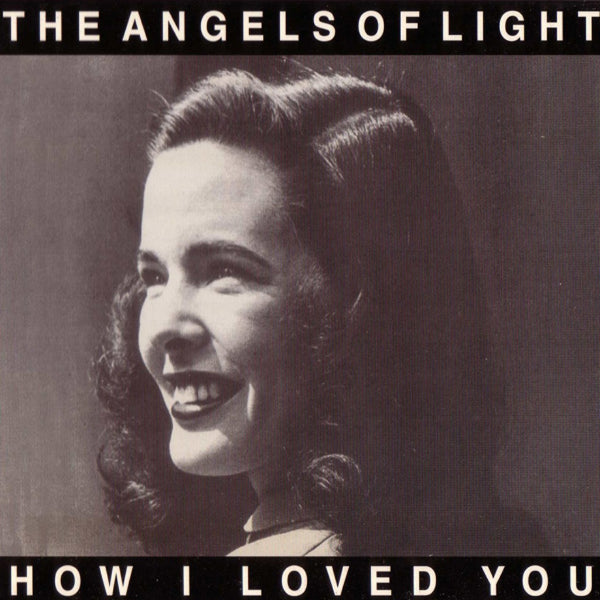
How I Loved You
Angels Of Light
YG16
Here’s a press release below for How I Loved You, written in 2001 – mg/ygr 2008
Here is the new Angels of Light album. I wrote the songs over the last couple of years. As it turns out, they're all love songs, in one form or another. The songs started out with just my voice and acoustic guitar, and then developed naturally over time by playing them with my friends (listed below), whose collaboration and contributions are positively inspirational, to me anyway. Our combined sensibilities feel very natural at this point, which I guess comes from having played most of the songs live a lot. The songs were recorded live in the studio, then subjected to my usual lapses of over-orchestration. In this case though, I think I reigned myself in, and the final sound/picture seems to fit organically with the basic songs and lyrics. Anyway, I did my best. You decide. Making this album was a labor of love for all of us. I think this intention comes through, and I hope you find something of use to you personally in the music...
- Michael Gira - Angels of Light/ Young God Records
Michael Gira - voice, acoustic and electric guitar, production; Christoph Hahn - lap steel guitar, electric guitar; Dana Schechter - bass guitar, piano, melodica, backing vocals; Lawrence Mullins - drumset, vibraphone, timpani, farfisa vip 600 organ, sleighbells, tambourine, castanets, glockenspiel; Birgit-Cassis Staudt - accordion, melodica, cassio, piano, backing vocals; Thor Harris - hammer dulcimer, piano, backing vocals; Bliss Blood - backing vocals and double vocal on #2, ukulele; Siobhan Duffy - backing vocals and double vocal on #5; Kid Congo Powers - additional electric guitar on #3 and #8.
Audio Interview with Michael Gira | Real Audio format
conducted by Ajda the Turkish Queen
recorded on November 13, 2001
Here’s some reviews from the time (more press) :
8/16/2001 | LA Weekly | Jay Babcock
Review | Angels of Light | How I Loved You
The mid-'80s work of New York industrial-grind-rock templateers Swans was so singular and so devastating that it was inevitable that its creator's future work would be burdened with unfair expectations. But like Nick Cave, a contemporary with a similar reputation borne from extreme early work, ex-Swans leader Michael Gira has found a way out. Released this past spring, "How I Loved You" is Gira's second Angels of Light album since he disbanded Swans in 1997. Swans' apocalyptic monolithia (surely still the soundtrack for many a session in a dominatrix's dungeon) have been exchanged for acoustic and lap steel guitars, piano and accordion, sleighbells and ukulele; Gira is more likely to sigh now than to bellow, to hum rather than shriek. The Angels allow Gira maintain the aesthetic intensity and under-appreciated pitch-black sense of humor of his Swans work even as the volume has softened, the music's textures and melodies have edged toward meditative country and western, and the lyrics have bent nostalgic. With a few notable exceptions, brutalism is out here, and a more subtle, layered sensuality is in. "How I Loved You" is made up of love songs. Or, actually, songs about loving someone from near or afar, and all that can entail: projection, jealousy, admiration, empathy, lust, surrender, subjugation. Even as these 'love' songs are rooted in specific historical coordinates or personages--young women in New York bars, Nico, Gira's mother, a teenage boy being raped repeatedly in an Israeli prison (there's that Gira humor)--the lyrics have a time-less, elemental quality to them: The city is a forest, the buildings are "towers of ice," the girls are "scattered crimson pearls." "And my fingers touched your two sleeping lips/as the echoes passed just above our heads/as the city flashed just beneath a cloud/that concealed the stars, that reflected sound/and protected us from an emptiness/and then drifted down, in a diamond mist," sings Gira in the albumës sumptuous opener, "Evangeline." The embodied is loosened from its physical vessel; the grossly material turns utterly transcendent; the prosaic is alchemically transformed. The Angels are at play.
5/30/2001 | Detroit Metro Times | Walter Wasacz
Angels of Light | How I Loved You | Review
Gira was a pop-culture original.
Once, seemingly in another lifetime, Michael Gira meted out punishment to himself and his fans like no one else has before or since. In performance, he and his band, Swans, were so loud, the music—played at a crawl, so slow it appeared frozen in time and space—bludgeoned the eardrums and made intestines vibrate.
But it was Gira's voice, which thundered and howled over this sonic sludge, that delivered the real pain. In the song "A Hanging," he prayed, "Dear God in Heaven/I'll hang for you." And in "Coward," he commanded a lover to "Put your knife in me/and walk away." (Both songs appear on Swans' divine and submissive 1986 masterpiece, Holy Money.)
Gira was a pop-culture original. A romantic literary outlaw spiritually descended from Celine and Genet, he wrote with the feverish hand of a condemned man—his songs evoking images of foreign prisons, public castration, slaves being raped. Gira grounded Swans, which gradually replaced their early monochrome harshness with Technicolor songs of Love and salvation, with 1996's Soundtracks for the Blind finale. It seemed Gira had pushed the thematic limits of fleshly humiliation and agitated mysticism as far as he could. Or did he? The Angels of Light, a group Gira launched the following year, shows him continuing his unyielding personal journey to the end of the night.
How I Loved You is the new band's second album (New Mother, released in 1999, was the first). It begins quietly with a beautiful power ballad, "Evangeline," and ends with "Two Women," in which Gira's narrator promises an idealized mother figure he will "kneel naked upon the burning coals/If you'll come for me." Gira's mother, whose portrait is on the cover, is clearly the object of scorn and devotion on How I Loved You. (Gira's father, who is pictured on the back cover, apparently plays little role here). She appears again in "Song for Nico," where Gira sings, "You are the reason I've stayed on this earth, Mother sing me into my birth." Gira turns his attention to other women (or, maybe not?) in "New York Girls." The song drones along a flat line created by organ, timpani and layers of acoustic guitars before it all breaks down into the kind of excuisite chaos and terrible beauty that John Cale brought to the Velvet Underground. When Gira, his voice now dreamy and numb, sings "New York Girls/I'll worship what you are/New York Girls/ How cruel and pure you are," Johnny Cash and Leonard Cohen (two artists who have also tracked their souls as they inch their way out of the body) come to mind. That's heavenly company for Michael Gira's Angels, to be sure. How I Loved You is a whisper, a rant and a remembrance: It seeks to answer questions most of us would never dare to ask.
4/1/2001 | WIRE | Issue 206 | Jim Haynes
Angels of Light | How I Loved You | Review
At the core of Michael Gira's being, there is an urgent need for transcendence and love.
Call it the soul, if you like; or call it the neurotic by-product of male sexuality. Gira would probably call it god albeit a god of his own making which reflects his registry of lofty ideals, applicable to all of humanity. Yet neither Gira nor anyone else in this world is without sins or blemishes when held in comparison to his own theology. In spite of his ultimate disappointment with humanity, in particular his own, he has anxiously waited, and sometimes violently pleaded, for providence - divine or otherwise.
When he conceived Swans 20 years ago, Gira proposed a direct assault to get to his spiritual essence with a blind rage aimed at the annihilation of the body. Without the body, he postulated that the soul could exist in perfect harmony with its ideal. The mistake in this hypothesis was in underestimating the connection between body and soul. Gira's humility has often qualified his command over Swans as a failure. This is obviously a hyperbole. Swans were a catalytic force that willed sound, action and life into existence. From those experiences, Gira has fashioned his complex mythology, which polarised divisions between misery and joy, ugliness and beauty, father and mother, salvation and damnation.
Perhaps in homage to what Swans meant to Gira, he effectively split its aesthetic in two: the soiled Ambient projects Body Lovers/Body Haters, and Angels Of Light, which centres around his talents as a singer-songwriter. Whereas the former is dedicated to evoking a response through psychoacoustic tension and sonic juxtaposition, the latter speaks more closely to Gira's personal god, as a unique mutation of the timelessness of country/blues storytelling and his solipsistic spiritualism.
True to its title, the second Angels Of Light album, How I Loved You, is a collection of love songs. It begins by speaking of love with elation in "Evangeline", as Gira pleads to his object of desire with the wistful innocence of a schoolboy. "Untitled Love Song" is his strolling duet with ex-Pain Teens singer Bliss Blood, both of them uncharacteristically full of sweetness and light. These are the most benevolent images of love Gira has to offer.
Thereafter he guides the album down a steep slope of sexual dependency, perverse lusts and a grizzled despair in which his body continuously betrays his mind's wishes to never have sex again.
From here on, How I Loved You follows similar patterns to the songs on Swans' Soundtracks For The Blind. Gira begins with a simple languid melody, then he steadily builds in complexity, continuously driving it into deeper, darker and more intense realms. "New City In The Future"- the album's 11 minute centrepiece - opens with an acoustic guitar strum, Gira offers a spacious simplicity which gradually submits to the increased volume from an orchestrated arsenal of organs, guitars and timpani, while its loose collection of fragmented memories moves freely between architecture and romance. Whenever a train of thought is lost or a metaphor collapses under its own weight, Gira growls "you were mine" as a mantra which intensifies into a bellowing howl by the conclusion. While "New City In The Future" might be addressing love lost, Gira could also be pining for his suffocating hole which, from his current position, may appear a better place than the lonely wisdom of a broken heart.
While the legendary masculine forces of Cash, Howlin' Wolf and Robert Johnson haunt this recording, Gira's orchestration also recalls Dolly Parton's recent return to bluegrass. Yet the muse that inspires and seduces Gira is far from the Disneyfied madame in The Best Little Whorehouse In Texas. She is a sexually explosive woman, at times the bloody, vengeful Salome, at others the nourishing, protective mother. She is the woman whom Gira loves, in spite of (or perhaps because of) the violence that she inflicts upon his soul, she has driven him to create many masterpieces, including this one.

